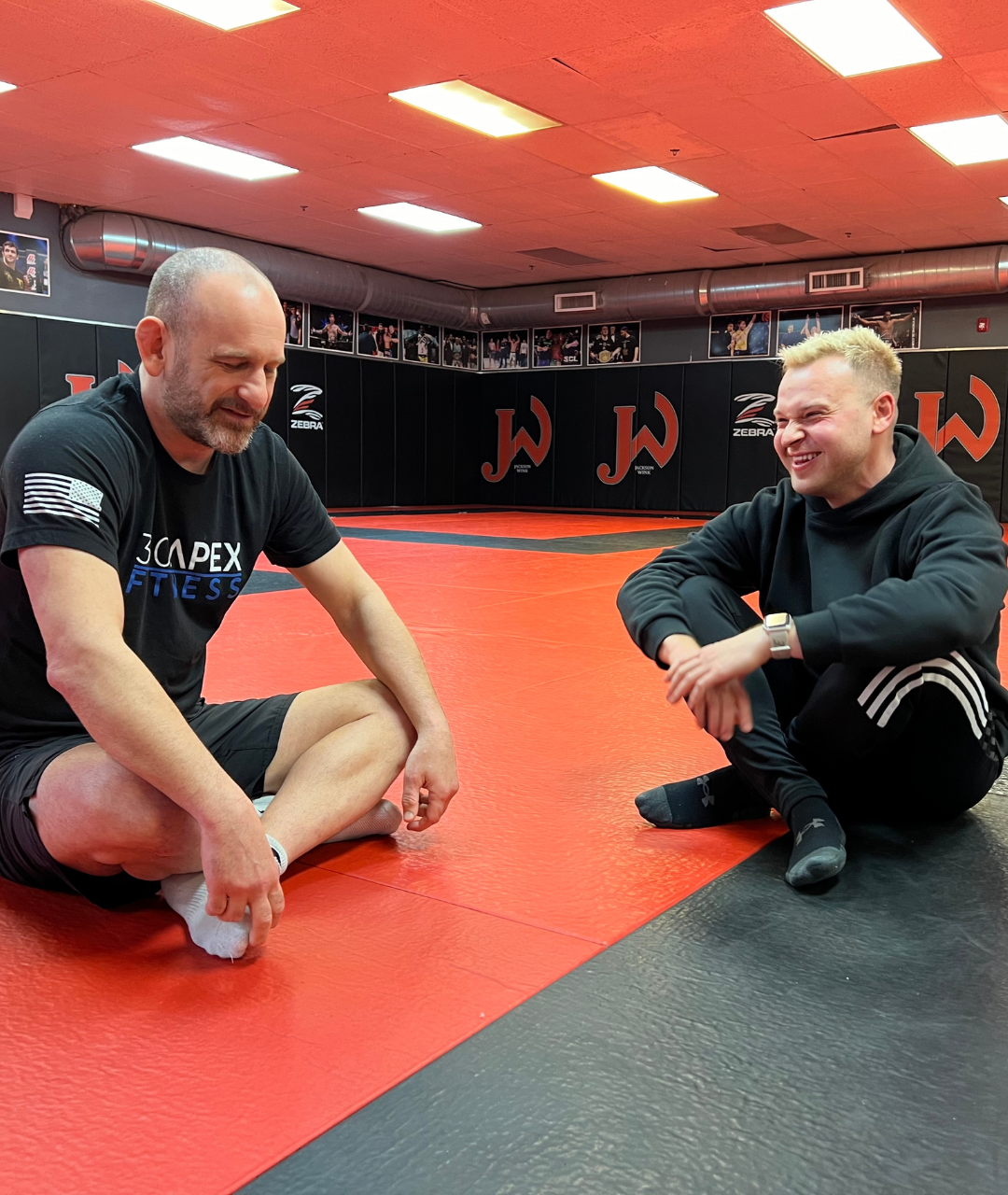
Greg Jackson - Curious Conversations
Greg Jackson is an American mixed martial arts trainer. He co-owns Jackson Wink MMA Academy in Albuquerque, NM. Greg has trained some of the top MMA fighters in the world, including UFC champions Jon Jones, Georges St-Pierre, and Holly Holm. Greg was born in Washington D.C. and raised in the south valley of Albuquerque. He created and taught a mindfulness class for the Albuquerque Police Department to learn techniques of how to subdue a suspect while being less combative, and started an MMA academy and ran it for several years before partnering with his friend and collaborator to turn it into Jackson Wink MMA Academy. Today they have 11 full time coaches and numerous UFC champion belts on their trophy wall.
LEARNING HOW TO FIGHT FROM MATHEMATICS
Gödel, Escher, Bach is the book Greg says has had the most impact on him. The book partly explores the work of Kurt Gödel – one of the greatest mathematicians of all time. One of Gödel’s famous discoveries was that there is knowledge beyond logic. Put another way, anytime you’re working in some kind of system governed by rules, there will always be certain questions that the system cannot handle but can be answered, so to speak, from outside the system. A given system is not bound by its own rules.
Greg has taken this idea and found his own expressions for it in studying music, art, and meditation that actually relate and apply to fighting itself.
THE ADVANTAGE OF BEING SELF-TAUGHT
Greg did not have a teacher. He is a self-taught fighter. And he comes from the pre-YouTube era where there are no free tutorials available to the public.
“I was raised in the south valley... I changed schools a lot from getting into fights. Fighting was something everybody did. And I was one of the few white kids at school, so I was singled out. It is a very machismo culture... Up until the end of middle school I had a tough time figuring out when violence was appropriate. I was caught between the social environment which egged-on violence, and my pacifist quaker parents who thought I shouldn’t fight ever.”
Greg credits coming from a non-traditional fighting background to being able to think outside the box and innovate.
HIS BIGGEST CHALLENGE
“One of our big challenges as a gym is that we’re almost too big. What I mean by that is we are maxed out with our dormitory, our coaches are maxed out with fighters, and we’re not getting the kind of financial support to equal those metrics.”
Greg even had a mattress propped up in the corner of his office because they were out of dorm rooms and the fighters basically live in the MMA academy!
THE HARDEST PART OF COACHING
“If you give yourself to the process, if you actually care such that when your guy loses you’re devastated, and when he wins you’re elated, it wears out your soul. You can only do that for so long.” Greg explained that he’s very hard on himself, and feels the weight of his losses despite all the success he’s had. “If one of my guys loses I take the blame because I think there’s always a way to win.” This idea really stuck with me. I agree – there’s always a way to win.
HIS BEST ADVICE
I asked Greg what he thinks the best advice he’s given his fighters is, and gave me a surprising answer. He said the best advice hasn’t been from him to a fighter, but something one of his fighters told him. This piece of advice came from Jon Jones, who told Greg to record a lot of videos of his loved ones, because when they pass on he’ll treasure those videos like nothing else.
Over the course of our talk it became clear to me how big of a family guy Greg is. He has a son who writes classical music, a daughter doing environmental work, a wife who works with kids with autism... Exceptional work must run in the genes.
FIGHTING AS A NECESSARY RELEASE
My biggest question to Greg had to do with what it was about fighting that attracts people to do it. It’s violent and can end terribly; for some, however, fighting is a vocation. Greg explained:
“It’s something inside people that has to come out. It’s in you. It’s organic. It’s something that can be a product of environment or genetics, or both, but it puts a little fire in you and the only way to get it out is to fight.”
Greg explained that he thinks violence is a part of human nature and society, and MMA is a safe, legally sanctioned way to deal with that part of ourselves. “Sometimes non-violence is appropriate in life, but sometimes it's not. Sometimes violence is more appropriate. A lot of people don’t get the nuances of that, but thinking that our lives can be completely non-violent is simply unrealistic. It’s unrealistic for kids and adults.”
Aggression and violence are a necessary part of living. We can deal with it in safe, healthy ways, or in destructive ways. MMA is the former. Additionally (and, to me, most interestingly), Greg said he takes this perspective when people get aggressive with him. Whether people are just nasty toward him, or try and critique him for coming from an unorthodox background in fighting, Greg had adapted the belief that he can absorb that aggression, because it needs to come out somehow, and he’d rather it come out toward him than towards someone’s kids, someone’s spouse, etc. There’s a heavy self-sacrificing component to an attitude like this, and I think this kind of attitude is held only by someone truly on a path of virtue.



